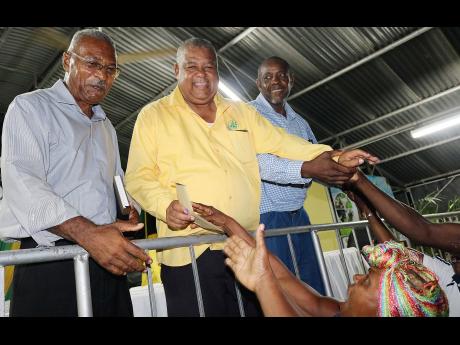Fulton gets the charge - Small farmers issue warning to new JAS president
Within minutes of being declared winner of Wednesday's presidential election for the Jamaica Agricultural Society (JAS), Lenworth Fulton was on the receiving end of unsolicited advice about how to run the umbrella organisation for which he takes administrative control in September.
"Make sure seh you fix up the Denbigh Showground," one farmer charged, advice that was quickly followed by a not-so-subtle reminder about the fickleness of human nature. "You make sure that the voice of the small farmer is heard, you hear, sir? Or else we will vote you out, just as easy as how we voteed you in."
Fulton, who campaigned under the theme of 'Honesty, Integrity, Transparency, Accountability', has promised, among other things, to lobby Government and the private sector for much-needed improvements in the welfare of farm families and, by extension, the agricultural labour force. He committed to addressing issues such as health insurance and pension benefits.
Fulton, a graduate of the Jamaica School of Agriculture (now College of Agriculture, Science and Education) and Tuskegee University in the United States with a diploma in general agriculture and a bachelor's degree in economics, respectively, has promised to take the 123-year-old organisation into the 21st century.
Delegates of the JAS responded favourably to his promise of transformation by giving him 254 votes, compared to Glendon Harris' 81. Denton Alvaranga was elected first vice-president with 258 votes, with only 70 favouring Hugh Johnson for the post. Two hundred and thirty-six gave their votes to Owen Dobson for the post of second vice-president, with Dr Hugh Lambert polling 88.
The elections, which were conducted by the Electoral Office of Jamaica, with Acting Director of Elections Glasspole Brown on hand to oversee proceedings, encountered a number of hiccups, but nothing out of the ordinary, according to Brown.
"We were contracted by the JAS to conduct the election. The counting of the ballots was done electronically, but the voting was the normal manual voting. There were some issues that we encountered, but we were able to work through those. [One such issue was] the late start in terms of the JAS releasing the delegates for voting," he told The Gleaner.

